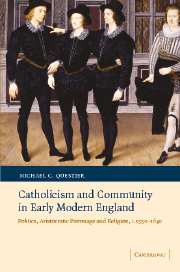 Catholicism and Community in Early Modern England
Catholicism and Community in Early Modern England Published online by Cambridge University Press: 06 July 2010
It was almost inevitable that once Richard Smith had returned, armed with his new episcopal status and authority, to the bosom of those aristocratic families which traditionally rendered support to him and his friends, he would take the opportunity to try to realise what had previously been just hierarchalist hallucinations. Of course, he and his circle would claim that his rule over the Catholic community in England was purely benign and, indeed, fruitful, just as William Bishop's had been. Faction and discontent arose, Smith claimed, merely because of the emulous bitterness of his enemies. When he started to insist that Catholic clergymen in England should turn to him for ‘approbation’, i.e. the (theoretically automatic) licensing of missionary priests to hear the confessions of their ghostly children, his critics maliciously (said Smith) seized on this instance of his dutiful attention to his flock's spiritual welfare in order to attack him.
Smith's claims about the peacefulness and benignity of his rule were, however, in their essentials, severely economical with the truth. As David Lunn has shown from the archives of the Congregation for the Propagation of the Faith (De Propaganda Fide), in autumn 1626 Smith launched a visitation of the entire country and, though virtually no formal records of it survive, he occupied himself at this time by transmitting rude messages to Rome about his critics in the religious orders.
To save this book to your Kindle, first ensure [email protected] is added to your Approved Personal Document E-mail List under your Personal Document Settings on the Manage Your Content and Devices page of your Amazon account. Then enter the ‘name’ part of your Kindle email address below. Find out more about saving to your Kindle.
Note you can select to save to either the @free.kindle.com or @kindle.com variations. ‘@free.kindle.com’ emails are free but can only be saved to your device when it is connected to wi-fi. ‘@kindle.com’ emails can be delivered even when you are not connected to wi-fi, but note that service fees apply.
Find out more about the Kindle Personal Document Service.
To save content items to your account, please confirm that you agree to abide by our usage policies. If this is the first time you use this feature, you will be asked to authorise Cambridge Core to connect with your account. Find out more about saving content to Dropbox.
To save content items to your account, please confirm that you agree to abide by our usage policies. If this is the first time you use this feature, you will be asked to authorise Cambridge Core to connect with your account. Find out more about saving content to Google Drive.